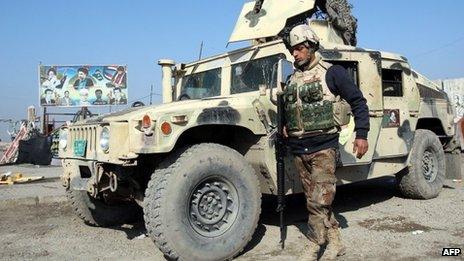Iraq violence: US speeds up supply of military equipment
-
Published

The US says it is speeding up the supply of military equipment to Iraq to help its government fight militant groups in western Anbar province.
The White House said additional surveillance drones would be delivered within weeks and more Hellfire missiles sent in the next few months.
Fighting in Anbar has led to some of the heaviest clashes in Iraq for years.
Troops are preparing to attack the city of Fallujah, which has fallen to Islamic militants.
However, a spokesman for Iraq's defence ministry told AFP news agency on Tuesday that it was not "possible to assault it now" due to fears about civilian casualties.
Much of the city is reported to be controlled by the Islamic State in Iraq and the Levant - known as ISIS - and Prime Minister Nouri Maliki has urged residents to drive them out.
The nearby city of Ramadi is reported to be under the control of powerful Sunni tribes working with local police, opposing pockets of ISIS fighters there.
Despite long-standing grievances against the central Shia-led government, the Ramadi tribes have renewed a pact with senior Iraqi army leaders to dislodge any presence of al-Qaeda.
As the violence increased, White House spokesman Jay Carney said the US was working closely with Baghdad to develop a "holistic strategy" to isolate al-Qaeda affiliated groups.
He said there had already been some successes but the situation remained "fluid".
"We're accelerating our foreign military sales, deliveries, and are looking to provide an additional shipment of Hellfire missiles as early as this spring," he said.
"I can add that in addition to those Hellfire missiles through our FMS (Foreign Military Sales) programme we will also be providing 10 ScanEagle surveillance UAVs (Unmanned Aerial Vehicles) in the upcoming weeks and 48 Raven surveillance UAVs later this year."
US Secretary of State John Kerry has already stated that no US forces will return to Iraq.
Correspondents say that despite withdrawing from Iraq at the end of 2011, the US remains a key security partner, providing more than $14bn (£8bn) worth of weapons to Baghdad since 2005.
Earlier, Mr Maliki said that if people in Fallujah expelled "terrorists", they would be spared military action.
Residents flee
It would ensure "their areas are not subjected to the danger of armed clashes", state television quoted him as saying.
Hundreds of Fallujah residents have already fled shelling and air strikes by government forces.
At the same time, the militants have called on Sunni tribes in the area to support them and have urged families who have fled the city to return to their homes.
The latest upsurge in violence began last month after troops broke up a protest camp by Sunni Arabs in Ramadi.
Many Sunnis in Iraq claim they are being marginalised by Mr Maliki's Shia-led government.
BBC Middle East correspondent Jim Muir says Islamist militants have been able to benefit from those deep-seated grievances.
Mr Maliki's drive to restore control is being seen by many Sunnis as an attempt at domination and oppression, and it is taking Iraq back to the brink of a sectarian civil war, he adds.
After the 2003 US-led invasion, al-Qaeda based itself in Fallujah where several beheadings and killings of foreigners took place.